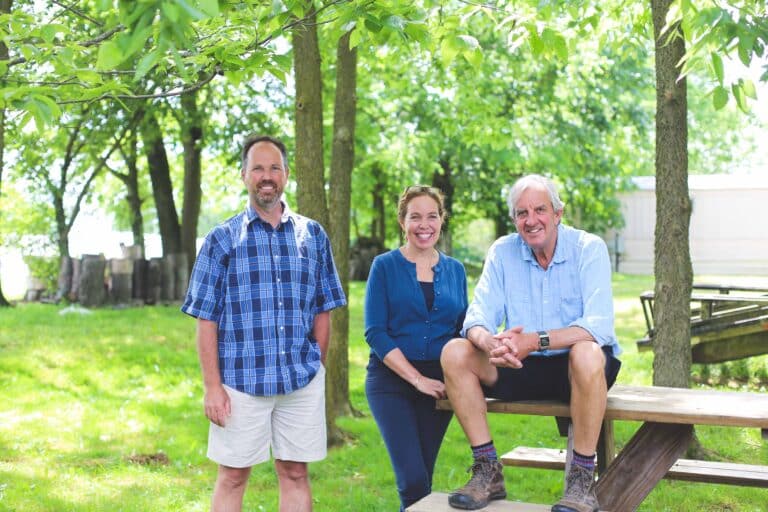
You read in this space about how your food is grown, but rarely do you get to know the people behind your food. Ann Bell Stone, John Bell and Mac Stone are the managers of the sixth-generation Elmwood Stock Farm, leading teams of field crew, delivery drivers, farmers market employees and office staff.
Siblings Ann and John grew up on Elmwood Stock Farm, farming with their parents, Cecil and Kay Bell, in what started as a traditional cattle and tobacco operation. Ann met Mac Stone at a farming conference right around the time she and John were transitioning the farm to a diversified organic farm. A few years later, Ann and Mac were married. John and his wife, Melissa Bell, live on the farm, too, and are raising their children here—the seventh generation of family farmers.
Ann, Mac and John answer a few questions here as a snapshot of the people behind your food:
Mac: My favorite job is handling the heritage turkeys. We get to steward them from hatched egg, to the brooder barn, and then out to their pasture. Each time we advance their mobile house to the next section of fresh pasture, the birds wander about the whole field and then come back to their home place, where we put up portable electric netting to protect them from predators while also allowing them to be turkeys. It’s enjoyable to observe their natural behavior: chasing bugs, finding fresh gravel for their gizzard, flexing their wings, acting like they’re going to fly away before boomeranging back to their house.
John: I have been working with the cattle herd for most of my life, first with my dad and now having taken over herd management. I’m working on my version of trying to breed a Kentucky Derby winner, except I’m trying to breed the perfect grass-fed, grass-finished beef animal. The introduction of the Wagyu cattle to our breeding program has us on our way to even higher quality, more well-marbled beef. I enjoy the long, slow process that it takes to develop cattle genetics.
Ann: It’s a toss up between putting out transplants in the spring or seeding in the greenhouse. I like the optimism of the vegetables that are to come.
Mac: Since we don’t have spring and fall anymore, it would have to be summer because of all the fresh vegetables available to eat. And I like the diversity of work, too, from caring for sheep to moving fence to mowing to cultivating to seeing all this food go out to our customers.
John: I love spring. The hope and optimism of planting, birth, all of the opportunities in front of you. The winter hibernation allows you to start over again with warming weather and longer days. The energy is higher. I like the birth of plants and animals, the repeated excitement of seeing—even after all these years—if it’s a boy calf or a girl calf or how the transplants that we set out yesterday are doing today.
Ann: Probably the summertime, because I’m not a fan of cold weather, and that’s when heirloom tomatoes are in season. I do also like the greenhouse and high-tunnels season, when we can be warm inside when the sun is out even though it’s cold outside.
Mac: Today, it’s a grilled organic, grass-fed hamburger, corn on the cob and a loaded tossed salad—tomato, carrots, radishes. (Read Mac’s full accounting of his favorite foods on the Good Foods Co-op blog.)
John: A grass-fed, grass-finished Wagyu-Angus steak and sweet corn with the year’s first crop of tomatoes and corn
Ann: Fresh leafy greens—whether it’s salad, arugula or baby kale—and a medley of heirloom tomatoes
Mac: Two things: It’s important that my work cares for living animals and plants. That’s motivation enough to get up early in the morning. Then, seeing our foods going to so many people every week, the satisfaction of knowing we’re helping people eat healthy food, completes the cycle.
John: Striving to grow good food for people in our community in a manner that continues to improve the quality of the soil, air and water is a noble challenge. I see the opportunity to mitigate climate change—even in a small way on our 500 acres in Central Kentucky—by employing livestock and plants to sequester carbon in the soil and refusing the energy-intensive inputs that are used to produce much of the food in this country.
Ann: I was raised to do work that has value, and this type of work meets that criteria. And as a farmer, you are essentially your own boss, so you get the reward of that as well as the challenges.
Mac: Coming out of the pandemic, I hope to re-engage with our customers through farm tours, which we’re offering on the second Saturday of each month through the main season in 2021. I also want to allow more people to learn about the farm by producing more videos, like the video that introduced our heritage turkeys to everyone last year.
John: I am continually working on refining our eight-year crop and livestock rotation, which we have been adjusting to include the implementation of the Holy Grail of organic agriculture, which is no till farming. This task ties in with my interest in the ways that regenerative farming plays a role in sequestering carbon..
Ann: I am spending time this year working to make our farming business sustainable—to focus on assuring the longevity of Elmwood Stock Farm while teaching, inspiring and training the next generation of farmers. Growing and delivering healthful, organic food is so much bigger than just the three of us managers. We are energized by the opportunity to pass along our knowledge and experience to others who are dedicated to the farm’s regenerative means of feeding our community.



Made with 
